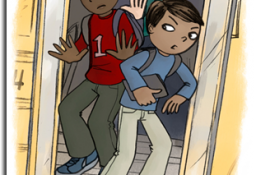I met with a young man last week because he was worried about being left behind in the job stakes. He was thinking of switching programs from a BSc in Biology
to something “more practical” like nursing because his two young siblings were in a nursing program that guaranteed a job after graduation. He didn’t see much prospect of getting a job related to biology without further education, despite the fact that he is currently employed in an internship with one
of the country’s largest health sciences companies!
Is this quest for job security a simple capitulation to market forces that are
increasing their influence over us in terms of how we think and behave?
Choices have consequences, and each choice constructs a thread that we will
follow daily as we create a story for our life.
This young man views education as an economic goal. Like most of us, he is
simply following a formula that is considered practical and realistic: good
education = good job, good money, good things. This is the story he is
living: we exist in order to buy happiness.
And one of our deepest fears is that we won’t get our share of the pie. I
remember that feeling well from my early 20s! Is that a real fear, or one that
is manufactured by others to serve their interests?
This young man won’t attend convocation ceremonies for another year but perhaps
he should listen to advice given this year to engineering graduates at a local
university by Leonard Lee, the founder and former CEO of a highly successful
international company, Lee Valley Tools.
“If you go where your passion leads you, you will probably do very well,” he
said, “although it is entirely possible that by doing that, you’ll never be
able to afford that Jaguar. But believe me, loving your work is more fun than
than driving a Jaguar.”
And he ought to know. Lee followed the same formula of grades=money; and, like
most people of the middle class, he had a pleasant job that provided a modest
sense of accomplishment, while still giving him time and energy for personal
interests. Most people would consider this a successful life, and simply
settle in for the long haul as a comfortable consumer and citizen of an
affluent society.
But if we scratch the surface of comfort, we may find the frustration and
dissatisfaction that drives people like Leonard Lee to change their lives.
That formula of grades=money teaches young people that we can buy happiness in
the face of convincing evidence that we cannot, e.g. drug addiction,
alcoholism, teenage suicide, divorce, loneliness, and other despairs are modern
plagues of the prosperous more than the poor. We don’t believe it, at least
not until we’re older and the accumulation of this evidence weighs heavily in
the scales of our personal experiences.
The stakes are bigger than just the quality of our individual lives. That
formula grades=money enhances runaway consumption and depletion of earth, air,
and water of our planet. We all pay a price for conspicuous consumption as the
benchmark of success! Driving a Jaguar is a sign of success.
Leonard Lee was a senior public servant when he quit his job at age 40 to
pursue his love of woodworking. He placed an ad in Harrowsmith magazine
offering the first 1000-item catalog for $1. Today, the same core business
earns $100M a year!
Lee is now in his 70s, and has learned what many individuals learn later in
life: having work that energizes you is better than having things. Joy is the
source of vitality and a life rich with purpose and meaning. Making money is a
by-product not the purpose of work. He’s had the Jaguar and he’s had the Joy;
he says he’ll take the joy any day of the week.
Of course, the old formula grades=money is still true for certain careers, such
as law, medicine, and engineering, where good grades are necessary for
acceptance into professional schools. And, all sorts of professional
credentials are increasingly used to establish criteria for certain job
postings in government and other large institutions.
But the world of work is changing rapidly due to social and economic pressures,
especially in knowledge sectors, where independent study, community service,
adventures and experience, large doses of privacy and solitude, are shaping the
formation of new kinds of workers and workplaces. (see The Future of Work). Common sense and the human nature of business people prevails in this space, where most hiring and promoting is done the old-fashioned way, using performance and private judgment as the preferred measures.
Finding our place in the world is a function of the story we live. One script
is being written by our market-driven culture, telling us how to live according
to what we buy. It takes courage at any age to view this story critically.
Leonard Lee has handed over leadership of Lee Valley Tools to his son. But he
didn’t retire like his former public servant colleagues. Why retire from
something you love doing? Today he is developing a line of surgical tools for the health care sector.
Years ago, he realized there was a dissonance between his public and personal
stories, his social self and his authentic self. He took a risk to bring
together what had been pulled apart for the sake of career. What he got was a
better story, a better life! That is the message he wants to pass on to all
young people.






 Do you think about changing jobs? The power to do so is right under your nose…well, behind your nose actually! Stored in your brain are memories about events and activities you truly enjoyed in life since childhood. Here are some tips for analyzing your life history for key success factors that reveal work that is personally and financially rewarding.
Do you think about changing jobs? The power to do so is right under your nose…well, behind your nose actually! Stored in your brain are memories about events and activities you truly enjoyed in life since childhood. Here are some tips for analyzing your life history for key success factors that reveal work that is personally and financially rewarding.

